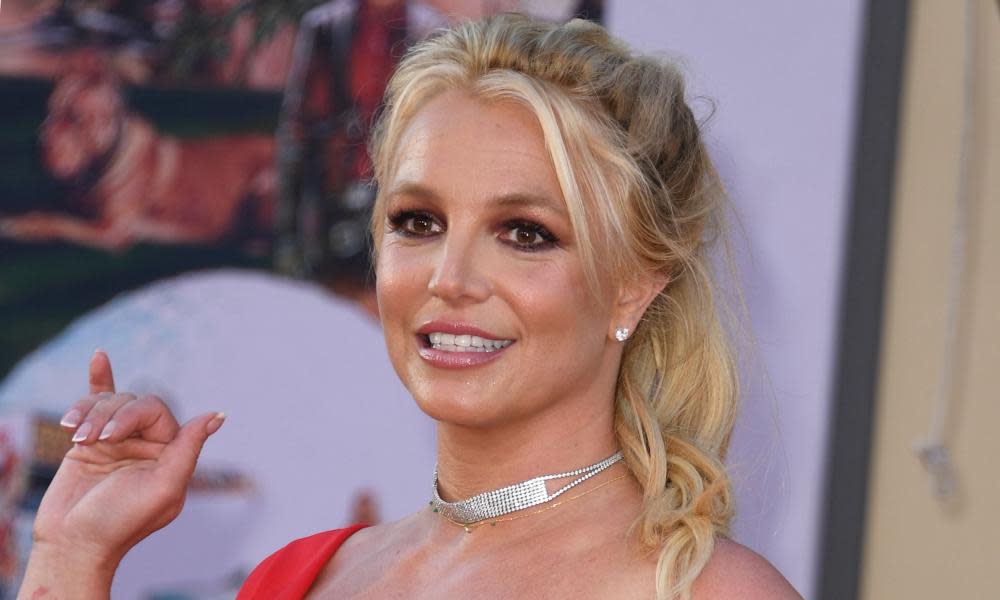The Woman in Me by Britney Spears review – a pop star’s stinging rebuke

Over the course of Britney Spears’ career, she was repeatedly subject to narratives constructed to disempower her. She was a teenage pop star presented as a virgin then scolded for a sexualised image sold by those same forces. After her breakup from Justin Timberlake, Spears was vilified and forced to undergo a grilling from Diane Sawyer so severe you might have thought she was a war criminal, not a double denim-wearing singer.
It made her suspicious of entertainment’s gendered double standard, she writes in her highly anticipated memoir, though that was nothing compared with the legal disfranchisement she later experienced. She was advised to divorce husband Kevin Federline to avoid the humiliation of him doing it first, only to take the flak for fracturing their young family. Her 2008 breakdown was conveniently framed as a sign of madness, not a proportional response to exploitation and losing custody of her children. Once she was placed under the conservatorship that would rule her life for 13 years, she became trapped further: “If I became flustered, it was taken as evidence that I wasn’t improving,” she writes. “If I got upset and asserted myself, I was out of control and crazy.”
The contradiction reminds Spears of medieval witch trials, she writes in The Woman in Me. As the most famous young woman in the world, she admits she “never knew how to play the game”. But at 41, her understanding of these archetypes and their connection to wider systems of power is more astute than any of the tawdry spin that did her dirty.
As for the spectre of the mad woman, Spears looks back to her paternal grandfather condemning two of his wives to an asylum. The first was racked with grief over the loss of a baby. She was put on lithium, and later killed herself. Britney’s father was 13 when his mother died, and she writes with empathy about the pain that later drove him to an alcoholism that tormented the family. The intergenerational trauma adds an element of Southern gothic to the smalltown Louisiana star’s story – one it’s easy to forget, given that she was 16 when she broke out, that was presented as a blank slate for fantasy. Spears restores that history with some lovely details: mums dressing their kids in matching colours for church, which inspired her and Timberlake to attend an awards ceremony in head-to-toe stonewash blue; the refuge the woods offered from her hellish home life.
Performance is her way out, and she plots a speedy path from off-Broadway to Disney to overnight pop superstardom. But once the gravy train starts chugging, neither her label nor her family will let her get off, even as Spears’ anguish reaches breaking point. When she gets pregnant by Timberlake, she writes that he persuades her to undergo an abortion. While she writhes in agony, “he thought maybe music would help, so he got his guitar and he lay there with me, strumming it”. Timberlake has not commented on the account given in the book.
Pushed to breaking point, Spears shaves her head in public in 2007: a “fuck you” to a world that wanted her to be pretty, good, a fantasy, a sex object and a role model, a passive product. Her account of this manic high is exhilarating: “It felt almost religious. I was living on a level of pure being.” It doesn’t last: her family ambush her into a conservatorship. Spears’ pained indignation about them restricting her freedom while flogging her earning potential sears the page.
She puts up with it because it ensures her contact with her sons, she writes, even enduring apparently arbitrary spells in rehab. The second comes in 2019 after Spears makes an objection during a rehearsal, and sees her isolated, surveilled and put on lithium – just like her grandmother, she notes. Her account of this two-month period is horrifying: it’s the point where the girl-next-door becomes the final girl in a true American horror story, one wrought by her father and, as she repeatedly points out, the state of California. A nurse tells her about the #FreeBritney movement attempting to raise awareness of her plight; it reignites Spears’ spark, and two years later, she calls 911. In November 2021, she is freed from the conservatorship. Jamie Spears has not commented on the book, but has previously defended the arrangement as a necessary tool for protecting her.
Anyone looking for starry anecdotes or studio vignettes won’t find them here. Instead, The Woman in Me tells a focused story that makes inarguable the ties between patriarchy and exploitation, and deserves to be read as a cautionary tale and an indictment, not a grab-bag of tabloid revelations. After all Spears has lost, the sharpness of her perspective is a miracle. She repeatedly questions why – whether as a teenager in a crop top “corrupting” the youth, or a 25-year-old getting drunk at the club – she was perceived as “dangerous”. May her truth pose a legitimate threat to the system that exploited her.


